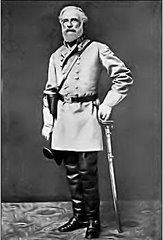The War On Religion
By Ron Paul
As we celebrate another Yuletide season, it’s hard not to notice that Christmas in America simply doesn’t feel the same anymore. Although an overwhelming majority of Americans celebrate Christmas, and those who don’t celebrate it overwhelmingly accept and respect our nation’s Christmas traditions, a certain shared public sentiment slowly has disappeared. The Christmas spirit, marked by a wonderful feeling of goodwill among men, is in danger of being lost in the ongoing war against religion.
Through perverse court decisions and years of cultural indoctrination, the elitist, secular Left has managed to convince many in our nation that religion must be driven from public view. The justification is always that someone, somewhere, might possibly be offended or feel uncomfortable living in the midst of a largely Christian society, so all must yield to the fragile sensibilities of the few. The ultimate goal of the anti-religious elites is to transform America into a completely secular nation, a nation that is legally and culturally biased against Christianity.
This growing bias explains why many of our wonderful Christmas traditions have been lost. Christmas pageants and plays, including Handel’s Messiah, have been banned from schools and community halls. Nativity scenes have been ordered removed from town squares, and even criticized as offensive when placed on private church lawns. Office Christmas parties have become taboo, replaced by colorless seasonal parties to ensure no employees feel threatened by a “hostile environment.” Even wholly non-religious decorations featuring Santa Claus, snowmen, and the like have been called into question as Christmas symbols that might cause discomfort. Earlier this month, firemen near Chicago reluctantly removed Christmas decorations from their firehouse after a complaint by some embittered busybody. Most noticeably, however, the once commonplace refrain of “Merry Christmas” has been replaced by the vague, ubiquitous “Happy Holidays.” But what holiday? Is Christmas some kind of secret, a word that cannot be uttered in public? Why have we allowed the secularists to intimidate us into downplaying our most cherished and meaningful Christian celebration?
The notion of a rigid separation between church and state has no basis in either the text of the Constitution or the writings of our Founding Fathers. On the contrary, our Founders’ political views were strongly informed by their religious beliefs. Certainly the drafters of the Declaration of Independence and the Constitution, both replete with references to God, would be aghast at the federal government’s hostility to religion. The establishment clause of the First Amendment was simply intended to forbid the creation of an official state church like the Church of England, not to drive religion out of public life.
The Founding Fathers envisioned a robustly Christian yet religiously tolerant America, with churches serving as vital institutions that would eclipse the state in importance. Throughout our nation’s history, churches have done what no government can ever do, namely teach morality and civility. Moral and civil individuals are largely governed by their own sense of right and wrong, and hence have little need for external government. This is the real reason the collectivist Left hates religion: Churches as institutions compete with the state for the people’s allegiance, and many devout people put their faith in God before their faith in the state. Knowing this, the secularists wage an ongoing war against religion, chipping away bit by bit at our nation’s Christian heritage. Christmas itself may soon be a casualty of that war.
December 30, 2003
Thursday, December 25, 2008
Wednesday, December 17, 2008
Verses: Courtship vs. Dating
Courtship vs. Dating
One debate that is growing in today’s American society is that of courtship vs. dating. How do two young people of the opposite sex pair off and eventually become one flesh in the covenant of marriage? Is dating the way this happens? Or is courtship the more appropriate way? Or perhaps is there a mysterious third alternative that has yet to be named?
I personally believe that the debate between courtship and dating is overrated by both parties. Those who reject the idea of courtship as silly, outdated, or too romantic for today’s time are often ignorant of the many dangerous associated with the way many people date today. However advocates of courtship who call dating “ungodly” or “unbiblical” often replace wisdom with rules – rules that are often times not found in Scripture in the first place.
The Bible is not a handbook on how to get married. Although we can use creative logic and principles found in Scripture to give us certain ideas of what the “falling in love” process should look like, it is never appropriate to make such legalistic rules as if Scripture demands them. Many who advocate courtship complain that while one person is dating, they may be dating several people at one time. These same people complain when two people get committed to each other so quickly. These people are often unable to understand all of their rules. How are we going to expect hormonal teenagers to understand them?
I do believe the way many people date today causes problems. I am not advocating we keep the world’s standards of dating, and that any attempt to revise the system is foolish. Many of the ideas that courtship offers are good ideas and should be taken into account. But what some people would call courtship, others may only call a wise form of dating. And some radical people who push for courtship push for what is close to arranged marriages, which is not Biblical either.
What are the differences in dating and courting? Essentially the goal of dating is to get a girlfriend, whereas the goal of courting is to get a wife. Courting usually promotes more family involvement. But other than this, the general idea of courting is not that much different than the idea of dating. It is foolish dating and fundamentalist courting that has its differences, and both are dangerous.
So what are the problems in today’s world of paring off a man and a maiden? I believe we push dating too early and marriage too late. Think about it: boys and girls reach the age of sexual maturity (or you could say sexual immaturity) at about age twelve. Now days, it is not uncommon for two twelve or thirteen year-olds to start “going out.” And somehow we expect them to not get married until their late twenties. So we have about fifteen years for boys and girls to date each other, all while their hormones are most rampant. This is no safe way to expect abstinence. On top of this, we have more divorces. Some people push for late dating and late marriages. This too has its problems in that children fail to grow up the way they used to. Beyond this, keeping older children who want to date from dating may cause rebellion. Pushing for early dating and early marriages would work, except we must then take the responsibility of maturing much quicker than we are now in today’s society.
I do not believe one should date, court, or whatever else you may call it, until marriage is at least in sight. Some fundamentalists believe that no one should date until one is completely ready for marriage. I believe this is too tall of an order. But I do believe marriage should at least be in the seeable future. One should not date someone without at least considering the possibility of marrying them. Recreational, directionless dating only goes south.
I also believe that it is wise to not simply do things alone. I am not against being alone on a date if you are mature enough to, but going in groups is important for various reasons as well. I believe the families should know who their children as well. Family relations is one thing that destroys relationships. I have seen family relations tear down one relationship, and both parties wound up getting hurt.
The problem is not, I do not believe, whether we date or court. It is that we are not preparing people for marriage. Conventional wisdom tells us that people should not think about marriage until their twenties. But I believe marriage should be on people’s minds from a very early age. We should be preparing ourselves to be emotionally, mentally, spiritually, financially, physically, etc. ready for marriage. Men should know how to treat women (with respect), and women should know how to treat men (by not always clinging to them for attention). This way we will be more prepared to date (or court), and beyond that, to marry.
What do you think?
God bless America
Pray for our Troops
December 14, 2008
Ryan Hampton
One debate that is growing in today’s American society is that of courtship vs. dating. How do two young people of the opposite sex pair off and eventually become one flesh in the covenant of marriage? Is dating the way this happens? Or is courtship the more appropriate way? Or perhaps is there a mysterious third alternative that has yet to be named?
I personally believe that the debate between courtship and dating is overrated by both parties. Those who reject the idea of courtship as silly, outdated, or too romantic for today’s time are often ignorant of the many dangerous associated with the way many people date today. However advocates of courtship who call dating “ungodly” or “unbiblical” often replace wisdom with rules – rules that are often times not found in Scripture in the first place.
The Bible is not a handbook on how to get married. Although we can use creative logic and principles found in Scripture to give us certain ideas of what the “falling in love” process should look like, it is never appropriate to make such legalistic rules as if Scripture demands them. Many who advocate courtship complain that while one person is dating, they may be dating several people at one time. These same people complain when two people get committed to each other so quickly. These people are often unable to understand all of their rules. How are we going to expect hormonal teenagers to understand them?
I do believe the way many people date today causes problems. I am not advocating we keep the world’s standards of dating, and that any attempt to revise the system is foolish. Many of the ideas that courtship offers are good ideas and should be taken into account. But what some people would call courtship, others may only call a wise form of dating. And some radical people who push for courtship push for what is close to arranged marriages, which is not Biblical either.
What are the differences in dating and courting? Essentially the goal of dating is to get a girlfriend, whereas the goal of courting is to get a wife. Courting usually promotes more family involvement. But other than this, the general idea of courting is not that much different than the idea of dating. It is foolish dating and fundamentalist courting that has its differences, and both are dangerous.
So what are the problems in today’s world of paring off a man and a maiden? I believe we push dating too early and marriage too late. Think about it: boys and girls reach the age of sexual maturity (or you could say sexual immaturity) at about age twelve. Now days, it is not uncommon for two twelve or thirteen year-olds to start “going out.” And somehow we expect them to not get married until their late twenties. So we have about fifteen years for boys and girls to date each other, all while their hormones are most rampant. This is no safe way to expect abstinence. On top of this, we have more divorces. Some people push for late dating and late marriages. This too has its problems in that children fail to grow up the way they used to. Beyond this, keeping older children who want to date from dating may cause rebellion. Pushing for early dating and early marriages would work, except we must then take the responsibility of maturing much quicker than we are now in today’s society.
I do not believe one should date, court, or whatever else you may call it, until marriage is at least in sight. Some fundamentalists believe that no one should date until one is completely ready for marriage. I believe this is too tall of an order. But I do believe marriage should at least be in the seeable future. One should not date someone without at least considering the possibility of marrying them. Recreational, directionless dating only goes south.
I also believe that it is wise to not simply do things alone. I am not against being alone on a date if you are mature enough to, but going in groups is important for various reasons as well. I believe the families should know who their children as well. Family relations is one thing that destroys relationships. I have seen family relations tear down one relationship, and both parties wound up getting hurt.
The problem is not, I do not believe, whether we date or court. It is that we are not preparing people for marriage. Conventional wisdom tells us that people should not think about marriage until their twenties. But I believe marriage should be on people’s minds from a very early age. We should be preparing ourselves to be emotionally, mentally, spiritually, financially, physically, etc. ready for marriage. Men should know how to treat women (with respect), and women should know how to treat men (by not always clinging to them for attention). This way we will be more prepared to date (or court), and beyond that, to marry.
What do you think?
God bless America
Pray for our Troops
December 14, 2008
Ryan Hampton
Subscribe to:
Posts (Atom)









